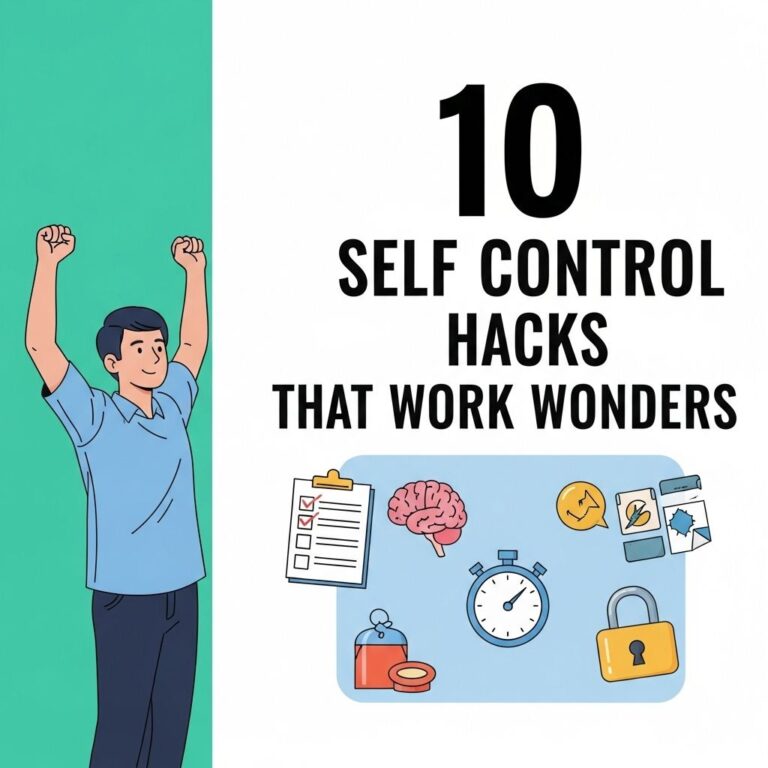In today’s fast-paced world, self-control has become more important than ever. The ability to regulate one’s emotions, thoughts, and behaviors is crucial for achieving personal and professional goals. Whether it’s resisting temptations, managing stress, or focusing on long-term objectives, self-control can significantly enhance your life quality. Here, we explore several powerful tips to help you cultivate better self-control.
Table of Contents
Understanding Self-Control
Before diving into tips, it’s essential to understand what self-control is. Self-control refers to the ability to manage impulses and delay gratification. It plays a vital role in decision-making and helps us maintain focus amidst distractions. Research suggests that self-control is like a muscle; the more you exercise it, the stronger it becomes.
1. Set Clear Goals
One of the most effective ways to improve self-control is to set specific and measurable goals. When you know what you’re working towards, it becomes easier to stay disciplined. Here’s how to set effective goals:
SMART Goals Framework
- Specific: Clearly define what you want to achieve.
- Measurable: Determine how you will measure progress.
- Achievable: Set realistic goals that can be attained.
- Relevant: Ensure the goals align with your values and priorities.
- Time-bound: Set a deadline for achieving your goals.
2. Develop a Routine
Creating a structured routine can significantly enhance your self-control. A consistent routine helps minimize decision fatigue and keeps distractions at bay. Here’s how to develop an effective routine:
Steps to Creating a Routine
- Assess Your Current Habits: Identify areas where you struggle with self-control.
- Establish Priorities: Determine what tasks are most important to you.
- Create a Schedule: Allocate specific time slots for each task throughout your day.
- Stick to It: Consistency is key; make your routine a non-negotiable part of your day.
3. Practice Mindfulness
Mindfulness involves being present in the moment, which can help improve self-control by increasing awareness of your thoughts and feelings. Implementing mindfulness practices can lead to better emotional regulation and decision-making. Here are some techniques to get started:
Mindfulness Techniques
| Technique | Description |
|---|---|
| Meditation | Spend a few minutes each day focusing on your breath or a mantra to calm your mind. |
| Journaling | Write down your thoughts and feelings to identify triggers and patterns that affect your self-control. |
| Deep Breathing | Practice deep breathing exercises to reduce stress and regain focus during moments of temptation. |
4. Find Your Motivation
Understanding your ‘why’ can provide the motivation necessary to stick with your goals, especially when faced with challenges. Here’s how to enhance your motivation:
Identifying Your Motivators
- Intrinsic Motivation: Reflect on personal values and desires that resonate with you.
- Extrinsic Motivation: Consider external rewards, such as recognition or financial gain, to spur action.
Tips for Staying Motivated
- Visualize success by picturing your life after achieving your goals.
- Share your goals with friends or family for accountability.
- Celebrate small wins to maintain enthusiasm and momentum.
5. Limit Temptations
Reducing temptations is a practical approach to enhancing self-control. By minimizing exposure to triggers, you can make it easier to stick to your goals. Here are some strategies:
Practical Strategies
- Identify Triggers: Keep track of situations or emotions that lead to a loss of self-control.
- Create Barriers: Use physical or digital barriers to limit access to distractions. For example, employ website blockers during work hours.
- Change Your Environment: Surround yourself with positive influences and eliminate negative ones.
Conclusion
Improving self-control is a journey that requires commitment and practice. By setting clear goals, developing routines, practicing mindfulness, finding motivation, and limiting temptations, you can cultivate a stronger sense of self-regulation. Remember that progress takes time, so be patient with yourself as you work towards better self-control. With dedication and the right strategies, you can unlock your full potential and lead a more fulfilling life.
FAQ
What are effective strategies for improving self-control?
Implementing techniques such as setting clear goals, practicing mindfulness, and using positive reinforcement can significantly enhance your self-control.
How does mindfulness help with self-control?
Mindfulness increases awareness of impulses and triggers, allowing individuals to pause and make conscious decisions rather than reacting impulsively.
Can goal-setting improve self-discipline?
Yes, setting specific, measurable, achievable, relevant, and time-bound (SMART) goals helps individuals stay focused and motivated, thereby improving self-discipline.
What role does environment play in self-control?
Creating a supportive environment by removing temptations and surrounding yourself with positive influences can greatly enhance your ability to exercise self-control.
Are there any exercises to strengthen self-control?
Practicing delayed gratification exercises, such as waiting before indulging in a desire, can help train and strengthen self-control over time.









